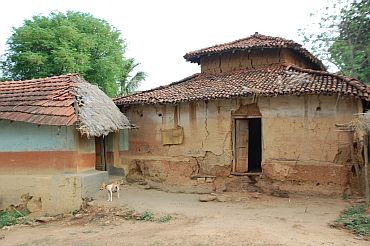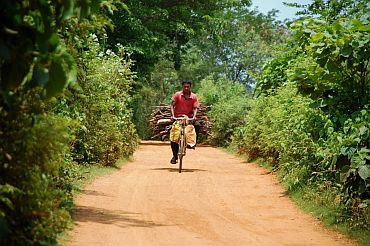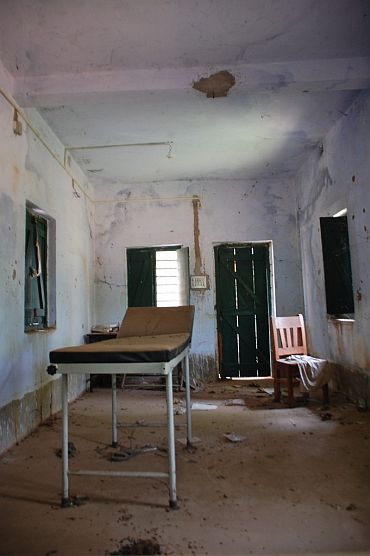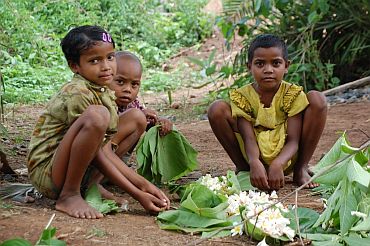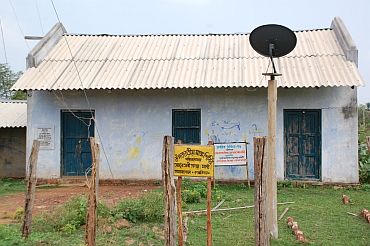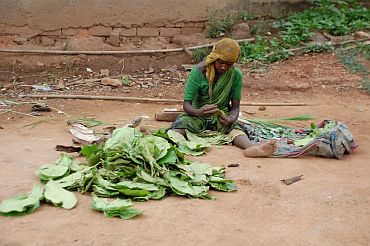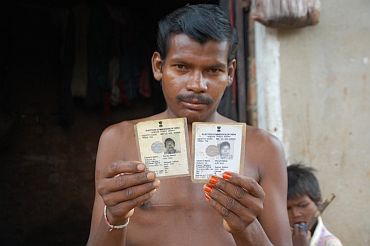 | « Back to article | Print this article |
No poll promises for these forgotten villages
As West Bengal readies for its sixth and final phase of the assembly election, rediff.com's Sanchari Bhattacharya visits the Maoist-affected districts West Midnapore, Bankura and Purulia, to find that talk about poriborton is the last thing on the villagers minds as they struggle each day to make ends meet.
In the clamour over the incessant violence in Jungle Mahal, the haunting facts about its impoverished villages sometimes get muted.
The Maoist-affected districts of West Midnapore, Bankura and Purulia are also home to some of the most poverty-stricken hamlets of India. "The government has forgotten that we exist," is a common lament among its residents.
They all talk about a life spent in hopeless poverty, interspersed with indifferent government measures and sporadic media attention.
Complete Coverage: Assembly Elections 2011
They are not interested in discussing Naxalism, the ongoing elections or even the 'winds of change' that may sweep the Left Front government away.
Survival is a bigger issue for them; they barely have the basic amenities like water, electricity or good roads. Schools and hospitals are few and far between.
Click NEXT to read further...
'If we don't move, we will starve to death'
Though notice boards about the Centre's flagship National Rural Employment Guarantee Scheme have been put up across the region, the scheme has not helped the locals much.
"We barely get work for 5-10 days (of the mandatory 100 days in a year) under the NREGA, if at all. To receive payment for those 10 days, we have to wait for months on end," rues Praamanik.
'We don't matter'
"The doctors are supposed to come here and treat patients two days a week. Sometimes they do, sometimes they don't. Often, they just sign the attendance register and leave," says Nilesh Mahato, a student.
Located on a slight incline, Odolchua suffers from a severe water shortage. Incidentally, the government has ensured that there is adequate water supply for the Central Reserve Police Force camp located barely a mile away.
"It (the government) has done nothing for us, we don't matter. We don't even have water to clean ourselves after defecation," said an embittered resident.
Final destination is Amlashol
Amlashol had hit the nation's conscience in 2004, when several starvation deaths were reported from this remote village. The damage to the state government was further exacerbated by a comment made by one of its ministers, who callously stated that the tribal residents of the village could always "survive on rats and ant's eggs if they had nothing else to eat".
Shaken by the outcry against the comment and the uncharitable media attention, the state government had put in some quick-fix measures. It built a health centre and a school inside Amlashol. It erected a water tank and electric poles.
No power supply, no doctors
The health centre near the village entrance is predictably shut; it seems to have been so for months. Though electricity poles are visible, there is no power supply.
"We have electricity sometimes. Most of the times, it isn't there," says Malati, a young woman who has been watching us from the doorway of her hut.
No phones, no TV
For medical treatment, the villagers rely on local quacks. In case of a serious illness, the patient is taken to Odalchua, Silda or Jhargram, between 15 and 40 km away.
Malati doesn't know that elections are going on, that her constituency is going to polls on Tuesday. She doesn't know who her legislator is; no candidate from any political party has ventured so far to campaign this time.
Chunibala Hansda, the local member of the legislative assembly, belongs to the Jharkhand Party Naren, an ally of the Trinamool Congress. She has visited Amlashol a couple of times in the last five years and has helped set up a school here.
No family in the entire village has a telephone or television, Malati informs us. Just round the corner, two boys are playing a Hindi song on a mobile phone. There is no network for cell phones for nearly 10 km around the village.
'We are waiting for the government to notice us again'
"We have to go to the city, make numerous rounds of government offices there. We can't afford to do that," says Paritosh Sinha. But he is hopeful that things will change for the better.
"You should have seen this village before it came in the news. We had nothing, absolutely nothing. Then we got a few facilities. Now we are waiting for the government to notice us again," says Sinha.
